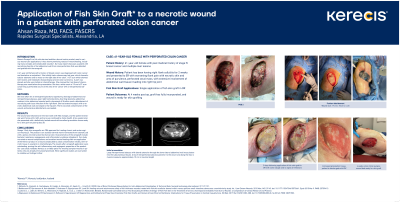Case Series/Study
(CS-119) Application of Fish Skin Graft to a necrotic wound in a patient with perforated colon cancer.

Kerecis Omega3 is a fish skin-derived acellular dermal matrix product used in various wound care applications. It has shown promising results in wound healing, including many complex and complicated wounds1. Our Case report discusses a patient with necrotizing fasciitis of her abdominal wall from colon perforation that was debrided and grafted with the xenograft.
Methods:
A 61-year-old female with a history of breast cancer was diagnosed with colon cancer and treated as an outpatient. She initially had a colonoscopy last year, which showed a tubular adenoma and no mass on the right side of her colon. A CT scan which showed liver lesions and metastatic disease biopsy-proven colon carcinoma. A port was placed, and she was started on chemotherapy. She received her last dose of chemotherapy one week before the presentation. She has a white count of 19 and a CT scan concerning a perforated cecum at the area of her cancer with a retroperitoneal abscess.
She was taken for an emergent Exploratory laparotomy, drainage of abdominal and retroperitoneal abscess, open right hemicolectomy, diverting ileostomy, abdominal washout, intra-abdominal omental patch, placement of Strattice mesh, debridement of necrotizing soft tissue infection of the right flank. She had extensive sepsis with a necrotic abdominal wall and sepsis to the hip joint. There was stool contamination of the wound, and extensive debridement was needed.
Results: The wound was followed over the next week with VAC changes, and the patient eventually went home with a VAC, and care was continued by home health. A few weeks later, she presented with a definitively healed wound with excellent granulation tissue ready for a skin graft on post-op day 28.
Discussion:
Omega 3 fish skin xenografts are FDA approved for treating chronic and acute surgical wounds2,3. The product is an acellular dermal matrix harvested from Icelandic cod with a porous microstructure like human skin. Characteristics of the xenograft include bacterial resistance, angiogenesis, and inflammatory cytokine mitigation3. Our study we noted no wound complications and excellent wound healing after one application of the Kerecis product in a wound complicated by stool contamination initially, with necrotic tissue in a patient on chemotherapy. The results after xenograft application were outstanding, proving the anti-inflammatory and angiogenic properties of the product. Our case study validates Kerecis as a viable option for treating complex wounds in patients who are already immunocompromised. More significant studies are warranted to validate our findings further.
Trademarked Items: *Kerecis™, Kerecis, Isafjordur, Iceland
References: 1.McGuirk, M., Kajmolli, A., Gachabayov, M., Haider, A., Bronstein, M., Spatz, D., ... & Latifi, R. (2020). Use of Direct Peritoneal Resuscitation for Intra-Abdominal Catastrophes: A Technical Note. Surgical technology international, 37, 127-131.
2.Baldursson BT, Kjartansson H, Konrádsdóttir F, Gudnason P, Sigurjonsson GF, Lund SH. Healing rate and autoimmune safety of full-thickness wounds treated with fish skin acellular dermal matrix versus porcine small-intestine submucosa: a noninferiority study. Int J Low Extrem Wounds. 2015 Mar;14(1):37-43. doi: 10.1177/1534734615573661. Epub 2015 Mar 9. PMID: 25759413.
3.Lullove, E. J., Liden, B., Winters, C., McEneaney, P., Raphael, A., & JC, L. I. (2021). A Multicenter, Blinded, Randomized Controlled Clinical Trial Evaluating the Effect of Omega-3-Rich Fish Skin in the Treatment of Chronic, Nonresponsive Diabetic Foot Ulcers. Wounds: a Compendium of Clinical Research and Practice.
4.Magnusson S, Baldursson BT, Kjartansson H, Rolfsson O, Sigurjonsson GF. Regenerative and Antibacterial Properties of Acellular Fish Skin Grafts and Human Amnion/Chorion Membrane: Implications for Tissue Preservation in Combat Casualty Care. Mil Med. 2017 Mar;182(S1):383-388. doi: 10.7205/MILMED-D-16-00142. PMID: 28291503.

.png)